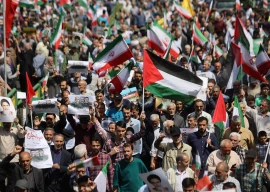
KARACHI:
President Asif Ali Zardari is not a particularly well-liked politician, and indeed, his record on economic policymaking leaves much to be desired. But he is not in the least bit responsible for the spike in oil prices and has absolutely no control over them.
So while complaining about rising petrol prices is reasonable, blaming it all on the president is irrational. Indeed, it can be argued that the government of Pakistan, since President Zardari’s inauguration has held prices at levels far below what would have been justified according to international increases.
Since the day President Zardari took office to this past Friday, international oil prices – as measured by Brent crude futures trading in London – have risen 26.6% in US dollars. The rupee, meanwhile, has depreciated by 18.7%, meaning that the collective increase in the price of petrol in Pakistani rupees should have come to 50.3%. Yet even if the so-called massive hike in petrol prices goes through, the rupee price of oil will have increased only 21.9% from the Rs86.66 it was in September 2008 to the Rs105.68 it is expected to be from April 1, 2012.
Hence, all of the so-called journalists on television screaming bloody murder about “petrol bombs going off” – a highly insensitive metaphor in a country wracked by terrorism – can stop with polemics. Petrol prices in Pakistan are actually lower than they should be. The public should be grateful that the price is not Rs130.27 per litre of petrol, which it rightfully should have been.
Simply put, the government is at the very end of what it can reasonably do in response to rising oil prices which is to cut taxes on oil. Given the fact that well over 97% of Pakistanis pay no income tax, it is unreasonable to expect the government to cut those taxes to zero. The government must get its revenues from somewhere, and taxing a major source of pollution is as good a place as any.
And in any case, even if the government were to continue cutting those taxes to zero, it would have absolutely no power whatsoever to bring down the price of oil, since no government in the world – not even the US and Chinese governments put together – can control a commodity that is bought and sold on a truly global scale. There is only one law oil prices obey: that of supply and demand.
On the demand side, Brazil, China, India and many other emerging economies have an insatiable appetite for energy that continues to grow apace, putting enormous strain on global suppliers. On the supply side, no major suppliers have come online and Saudi Arabia remains the only country in the world with any meaningful spare production capacity.
It does not help that Saudi domestic consumption has jumped by about 67% over the past decade, despite only a 37% rise in population. The Saudis – the world’s only reserve producers of oil – are now consuming about a quarter of their own oil.
Knocking Iran off the global list of oil suppliers – through sanctions and other restrictions on the country’s oil industry – also have the effect of constricting the availability of oil at a time when consumption levels are skyrocketing.
In this context, Pakistan is little more than a bystander. Less than 15% of the oil consumed in Pakistan is produced domestically, according to experts in the energy industry. The vast majority of it is imported from other countries. Pakistanis may have a lower purchasing power than Americans or Europeans, but we buy our oil from the same market and hence must pay the same price. It may hurt, but it is not our government’s fault.
Published in The Express Tribune, April 1st, 2012.
-----------------------------------------------------------------------------
[poll id="707"]
COMMENTS (33)
Comments are moderated and generally will be posted if they are on-topic and not abusive.
For more information, please see our Comments FAQ

































































A very one sided one-dimensional article. No matter what the government argues, the blame still falls on them. Prices never decrease when the global prices decreased. Income tax is not paid by our 'elected' officials. Tax is deducted from our salaries at source. So, I know I pay my taxes. You can bring out every possible angle, but there is no way you can justify the insane and inhuman increases in prices. We might as well bring out our cycles instead of our cars!
As per your analysis: “Given the fact that well over 97% of Pakistanis pay no income tax, it is unreasonable to expect the government to cut those taxes to zero. The government must get its revenues from somewhere, and taxing a major source of pollution is as good a place as any.”
... ... Alright, we don't pay taxes, but who is supposed to ensure collection of tax? I, you, or the government? This government is an absolute failure!
Agreed its high internationally and we don't pay taxes. But can the government at least stop using the revenues on their luxuries?
This is a pretty biased version in favor of incompetent government. Look at your words
"Given the fact that well over 97% of Pakistanis pay no income tax, it is unreasonable to expect the government to cut those taxes to zero. The government must get its revenues from somewhere, and taxing a major source of pollution is as good a place as any."
Just because govt has failed to increase the Tax Net, you are justifying the increase. stating it to be the major source of pollution, thats hilarious. How many of our elected rulers actually pay taxes?
Citizens don't demand to cut taxes to zero, they want equality & some SENSE in taxation authorities for policies they make.
What were the alternates to encounter the energy challenges ?? i hope you will not dare stating FAILED rental power project here.
How many new dams/water reservoirs were completed during this tenure ? i hope you will have to scratch your head hard to count any.
Assuming you are right.. This "source" of Pollution is so bad..that govt. have sabotaged the railway & national airline. Its high time for guys like you to stop defending & start accepting. This govt. is too late for any reforms.. just too late for anything. "Sharam Magar tum ko nahi aati"
Its 1st april fool today , rest you all are wise :)
Very timely article to play the April fool prank! How can such a 'far from truth' article can even get published?
Mr. Termizi: benchmark for Pakistan oil isn't Brent, it's "Arabian Gulf Arab light Crude"
If your basis of analysis is inaccurate, I don't buy the rest...
may be u r right in that but consider the devaluation of pak rupee and inflation@Ali Sarwan:
have a look around few countries India 65.65 Indian rupees = 117.039642 Pakistan rupees South Africa 11.94 South African rands = 141.481696 Pakistan rupees Canada 1.31 Canadian dollars = 119.046769 Pakistan rupees Japan* 32.2 Japanese yen = 35.2142818 Pakistan rupees Europe 1.63 Euros = 196.944178 Pakistan rupees South Korea 2043South Korean won = 164.023561 Pakistan rupees turkey 4.54 Turkish liras = 232.895333 Pakistan rupees
*Increase in rate
@faraz: Oil has gone up to $145/bbl (Jul 08 if I remember correctly). That translates to roughly Rs54/liter taking Rs60/$ as the exchange rate. Now gasoline is usually priced at a premium above oil (usually 10-20%). Plus the freight charges and the GST, which is unavoidable. And then add the IFEM and OMC margins. So you're telling me that the petrol you bought back in the day was NOT subsidized?
Also: http://www.reuters.com/article/2008/03/16/us-pakistan-petroleum-idUSISL7744920080316
A sensible article on the cold facts. This should have been said a long time ago.
@Ozair: Absolutely wrong; petrol has never been subsidized in Pakistan. It's the tax figure (levy) that has fluctuated and which is way higher than GST.
@Asim: Just adding to Asim's comments: GoP is innocent and is not responsible for anything happening in and to the country; they are here just to protect "democracy" which is endangered and has highest priority!
Since the govt. is such a parasitic force we need a smaller govt. that can survive off lower tax revenue. What use is such a bloated and corrupt govt. ? What use is such a bloated and corrupt military? A smaller army and a smaller govt. will lead to lower petrol prices and lower inflation as well.
@Not me: Except in 2008, petrol heavily subsidized and now it hardly is. Part of the reason we almost went bankrupt back then was the government refusing to increase petrol prices as international oil prices rose. Also you're telling me that the price of petrol minus the taxes is around Rs40 per liter? That's $70/bbl of petrol my friend compared to oil that's been trading at above $100/bbl for a while.
@Anu: Except we import petrol in itself to consume mostly for transport-related purposes, not power. But your point is valid. We should also develop a better public transport system and encourage its use.
This is a classic example of selective number smoke screen. I am sure that the author knows that the oil price got down to as low as $34 per barel in international market in 2009 and for around 18 months stayed near $50 - $80 range? Picking 2 times in space in a bias fashion in order to portray a selective picture is utterly irresponsible. Also, what about measuring the price on the pumps in rupee terms on Mar 24, 2008? That was the day that Zardari basically took charge of government by picking his hand-picked PM. The price was closer to Rs 60 or so and that was during the time when international price of oil had really shot up to beyond current levels before coming down big time end of 2008. Basically govt benefited from a huge break during 2009 and 2010 as it kept the price very high in domestic market while it was very low in intl market. The question also is whether we are near a major addition to the power grid soon? Did a major project start to diversify our energy consumption over last 4 years? Oh yes, I am mistaken. It did. The RPP project started for sure. And I am sure the author understands the link between electricity situation and petrol prices in the country.
shocked at such a selective analysis.
Agreed with you Farooqi. Govt have no choice rather imposing Indirect taxes & generate revenue just because many of Pakistan peoples do not pay Direct taxes. As far as corruption is concern I must say that in Pakistan even the common men himself is doing corruption by any means so why we should only blame Govt. 1st of all we have to self assesses our selves & then INSHA ALLAH we will make difference.
there is no truth in this article. it is a govt funded article. someone talked about oil prices in neighbour country would you like to compare prices of other utilities? Are they also lower than ours? What is value of indian rupee against pakistani rupee? Our econmic growth is lowest in the history.
Let me confirm the facts.....
Despite the international price increase... but our actual impact devaluation of Rupee and overall in economy is downturn due to massive corruption etc in last 4 years.... politically instability....Industries are closing moving to other countries this was not the scenario back 2000-2006
Why dont they reduce dependence on oil in power generation atleast and subsidise HSD since HSD rise means a knock on effect on general inflation?4 years is a lot of time to bring power generation units like solar and wind energy in the national grid!
No, its never government faults ....... Its always out fault, government is so innocent that it has no control on anything ....... Prices go high itself, law and order deteriorated itself ....... Sorry, tribune favoring the government on such a huge increase ......... not acceptable.
Agreed. But at the least, we can start some planning for hedging against such supply shocks through energy source diversification. You mentioned very well the factors that are contributing to this challenge and those are going to stay with us for a long time. Rather than taking the hit every time there is movement in commodity markets, how about we develop buffers to absorb the shocks gracefully. On a side note, I am in 100% agreement with you on the issue of taxes. That is something that needs dire attention.
Brent oil price was US$145 in July 2008.
Now it is trading around $110.
So please be fair in your reporting. The fact is over 60% of the price at petrol pump is TAXES in one form or the other.
Having stated the above, petrol prices in Pakistan are still one of the lowest in the region amongst non-oil exporting countries. In Delhi price of petrol is about Pak Rs 117/litre
A breath of fresh air, some sane analysis.
About time someone said this! And I agree that the "petrol bomb" metaphor is extremely insensitive. Thank you Farooq!
Increase in Oil Prices -> massive devaluation of Rupee during Zardari's tenure -> bad governance, printing of money, horrendous corruption -> Sorry but the blame lies on the corrupt Government